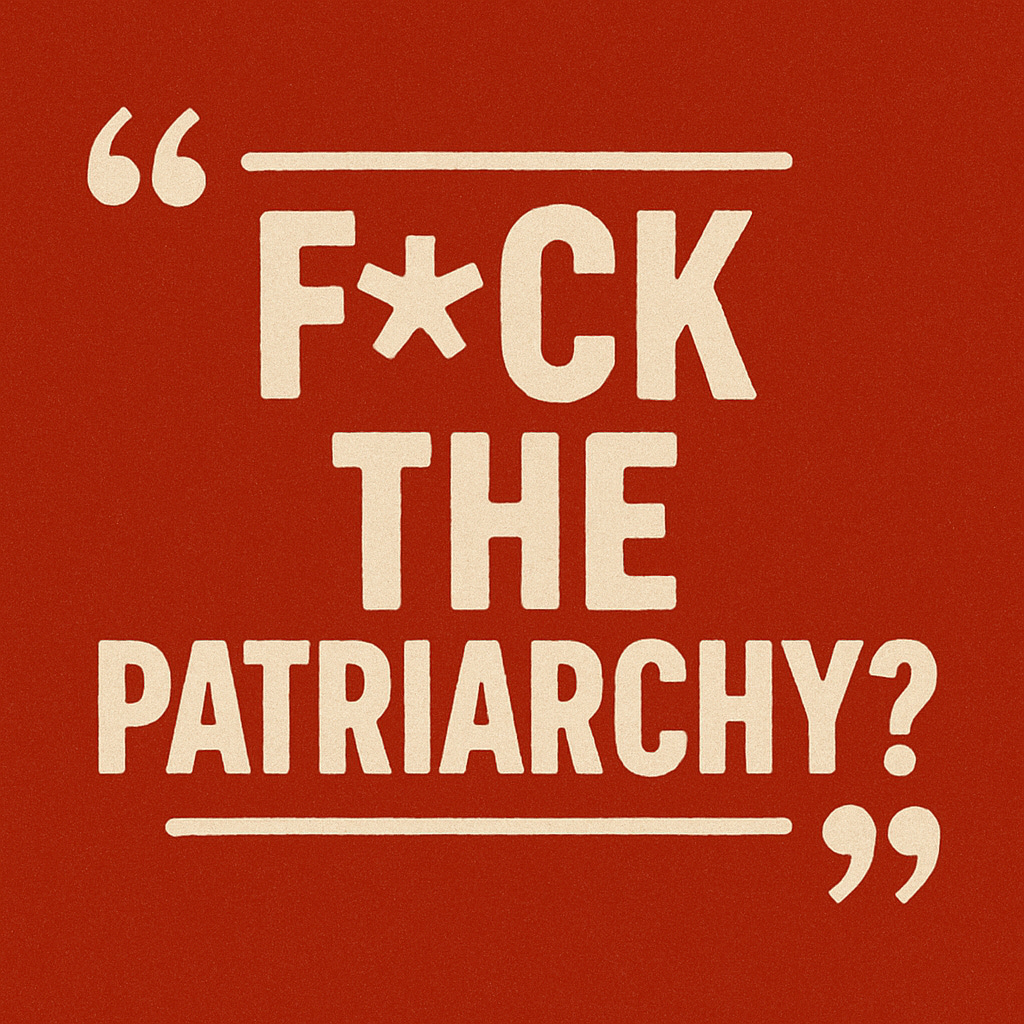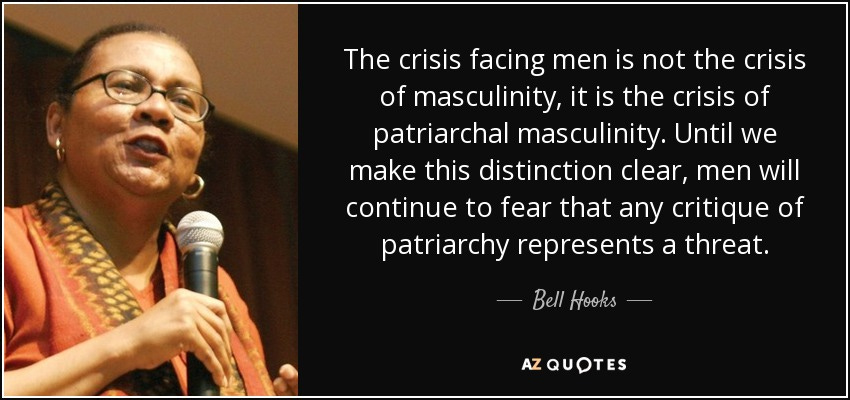"F*ck the patriarchy"
Digging a little deeper into this phrase, and where language can be harmful.
Even the word “patriarchy” will stir a lot of feelings.
There’s a lot to unpack here, but one thing that’s for certain is that, generally speaking, conversations around “the patriarchy” will cause divides and derision between men and women.
As we see it, this is the problem from both sides:
A large portion of women use the term "patriarchy" interchangeably with “all men” or will say things like “fuck the patriachy” when referring to all men.
A large portion of men get immediately defensive when they hear the term, taking it as an attack on themselves, men and masculinity.
What often then gets missed is the very real, very fair frustration that lies under the surface. But what also gets missed is a nuanced, balanced conversation on the topic.
Because, whether we consciously like this or not, the reality is that the word "patriarchy" has become synonymous with men. What can be forgotten is that the patriarchy is not a man. It’s a social system that is upheld by both men and women.
Yes, the system is one that has primarily been designed by men and to aid men, and it sees men maintain the majority of positions of power around the globe. And, of course, it means there are plenty of men who abuse it.
But it is still a social system, not a noun that we can use to describe men.
We have to acknowledge the level of privilege that comes with being a man living under a patriarchal society. In many ways, he already has a leg up.
But privilege is relative and it’s a spectrum. It’s not a binary thing that we either do or don’t have, it’s something that we all have to different degrees in different areas. And for a man who may not be as privileged in other areas in that he may suffer more persecution or oppression, let’s say because of his class and race, I can assure you that he isn’t flying out of bed every morning praising the patriarchy. He is suffering just as much as others, and more than plenty.
Sam Fender got it right when he said “keep telling working class lads on council estates they’re privileged and they’ll keep running to Tate”.
So we have to understand that the patriarchy is a social system, and we need to be able to have more nuanced conversations on it, and be careful with our language. Lumping all men under the umbrella term is not only factually incorrect, but it’s only going to cause immediate divides.
And for men, this means understanding that an attack on the patriarchy isn’t an attack on your character or masculinity. We have to be able to put our masculine ego to one side and understand that for many, the social system we live under is causing a great deal of harm and inequality, for women and men.
The American author, bell hooks, wrote in her book The Will to Change, that “the crisis facing men is not the crisis of masculinity, it is the crisis of patriarchal masculinity. Until we make that distinction clear, men will continue to fear that any critique of patriarchy represents a threat.”
In other words, it’s a very narrow, power-driven version of masculinity that some men abuse and perpetuate that is something we need to work back. It is not masculinity as a whole, and masculinity shouldn’t become synonymous with the patriarchy, although there are undeniable overlaps.
The patriarchy’s greatest powerplay in its survival is what we’re currently seeing: divides, fights and battles. “Us versus them” and zero sum games. Men vs women. This is exactly what it wants. What it fears more than anything is unity. Men and women together, fighting together to unpick and dismantle a social system which benefits the few, not the majority.
This all sounds a little V for Vendetta and if you’re reading this and thinking we’re getting a bit too high-brow here, we’ve got you. It can be easy to read about social systems, class structures and ways of working that were invented long before us, and that require mass mobilisation to dismantle, and think “sounds a bit tough, I’m out.”
So what can we all do immediately to play our part in changing the narrative and bridging divides?
Watch our language. Talking in generalisations is normally a sure-fire way to piss off a whole bunch of people. Humans are way too unique to be lumped into small little boxes. When talking about the patriarchy, are you talking about the actions of an individual man or group of men? Or are you talking about a social system? Does the phrasing feel correct? Is it nuanced enough?
Men lead the charge. Building a better society for everyone is an impossible task if only one side is doing it, or all sides are divided. It needs everyone. That being said, many groups, particularly women, have (generally speaking) had the worse of it under our social system, and have been fighting battles for a lot longer. The more men we can have leading the charge for change (for both men and women) the better.
Give men the space. Men need to be given space to share how they’re feeling and talk about the struggles they also feel living under this system. Because they’re real. Men voicing their own struggle does not negate the struggle of others. We can’t have it both ways - asking more men to help lead a change, but then also not giving them the time or space to understand why many men want change too.
Learn from women. As we said, women have been fighting a lot of battles for a long time in this system, and have developed ways of getting by, of surviving, of supporting each other. As men, we could learn a lot by a) listening to the experience of women, b) helping to support their platforms, and c) learning from what they did and are doing, so we can replicate this for men.
Examine our own responses. What comes up for you when someone says “fuck the patriarchy” or “ughhh, men.” Do you feel pissed off? Like you’re being missed? Don’t care? The start of any good conversation comes from us having an understanding of our own beliefs, bias and emotions that we’re bringing to the table and maybe projecting. We’re not saying it’s wrong for you to be pissed off, we’re just saying it’s good to be aware of it.
Try to have empathy. This conversation goes to division so quickly because there’s so much anger and frustration on both sides. It can be hard as hell when someone says something that enrages us, particularly if it’s misguided, but try to take the emotion out of this conversation, understand the place it’s coming from on the other side, and then have a conversation from there. When we write about men’s rights on LinkedIn, we can guarantee that we’ll get at least one comment from a woman essentially asking how we can talk about men when women “have it worse”. We used to get annoyed at these comments (well, we still do a bit), but we know now it’s borne out of years, decades even of frustration. Rather than snap back, we explain our side with respect and empathy. We hold our ground and stand firm, but we don’t make it an argument.
One question that we’re left with ourselves is: is the patriarchy bad? If we take the Cambridge Dictionary definition of it: “Patriarchy is the control by men, rather than women or both men and women, of most of the power and authority in a society.”
Then yes, that sounds pretty bad and unequal. But what feels important to say is that this isn’t about saying men shouldn’t be in positions of leadership, or shouldn’t display qualities of a leader.
The phrase “fuck the patriarchy” can feel synonymous with “fuck men in power”, and we shouldn’t conflate the two. But it’s clear we need a change. What does that look like? We’re not completely sure, and a quick Google tells us there might not even be a term for it - please do let us know in the comments if there is one.
But this is what Google did return:
The "equal version" of patriarchy isn't a single term but rather a concept described as a partnership-oriented society where power is distributed equitably, emphasizing collaboration and collective well-being instead of hierarchical dominance. While the term matriarchy is often considered its counterpart, referring to female-centered power, it is not a perfect inverse but rather a different social paradigm that stresses shared power and nurturing relationships. The ideal "equal version" would be a society built on these values of partnership and equality, rather than a simple reversal of male dominance to female dominance.
Whatever that is and whatever it looks like, that sounds pretty good to us.
Jump into the comments below, we’d love to hear what your experience of all of this is. Anything we’ve missed? Any good or bad experiences that align with the above? Let us know - we’re all ears!





